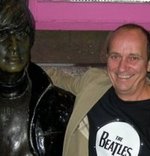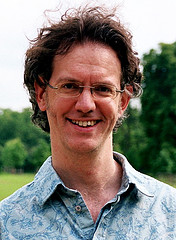27 July 02010
Fred Garnett on how to create new contexts for your own learning

I kept coming across Fred Garnett's name so often in my favourite online spaces that I began to believe we must have met some time ago, and I'd just forgotten it. As it turned out, when I introduced myself in June, Fred couldn't remember us having met either [Update: Seb Schmoller has reminded me that Fred and I were both participants in the email group for the Network Users' Forum a decade ago!]. Yet, as soon as we started chatting, we came across more and more areas where our interests coincided, from learners bootstrapping their own learning to innovations in the use of recording studios. In fact, Fred has explored where these two fields intersect — but more of that in a moment.
Following a range of teaching posts, from US universities to UK Further Education and Head of Community Programmes at Becta, Fred is now affiliated with the London Knowledge Lab. He's active in the informal Learner-Generated Contexts group. He's interested in how learners deal constructively with the unknown and how they reframe problems in an unpredictable world.
In some ways, Fred's work represents a more involved conceptual discourse around the themes in my interviews with and by David Gauntlett. So this interview will appeal if you want to dig deeper in those areas. Partly as a consequence of this, it is more dense in terms of terminology and concepts from educational theory. Hence a slightly longer preamble before we get to the interview proper.
What drew me to Fred's work was the focus on how learners can create the conditions to manage their own learning. This develops some of the themes in my interview by David Gauntlett, particularly around authority and power in learning. The challenge it represents to teacher-led learning is anathema in some quarters.
Continue reading "Fred Garnett on how to create new contexts for your own learning "15 July 02010
Elaborating on Agile Learning

I resist requests to pin down Agile Learning with a tight definition. I see it as a family of approaches, and when you've seen a few of these approaches perhaps you start to detect the family resemblances, and spot more distant relatives. Sure, the approaches share some things in common. The main thing, I think, is that they offer a response to the unprecedented circumstances we find ourselves in now, characterised by enormous richness of learning resources and tools, combined with harsh austerity in financial (and thus human) resources. I also happen to think that a degree of self-organising by learners is a promising path to take.
But this is an open and open-ended endeavour. It will evolve in unpredictable ways, which is why I think 'fixing' it in manifesto-style language. Yet, at the end of my interview with David Gauntlett, David asked if he could turn the tables and ask me a few questions. I left the tape rolling (actually an MP3 recorder) and recorded the impromptu discussion that followed. I confess that, in transcribing the recording, I have taken considerable liberties in rephrasing and elaborating what I said!
David Gauntlett: So why Agile Learning?
David Jennings: First there's a practical concern, that we've just gone through a period — starting with the dotcom boom but continuing only slightly abated since then — where a lot of money has been pumped into internet-based learning initiatives with Grand Designs. This has been based on growth projections, a few celebrated success stories like Google and Amazon, and large doses of faith and optimism. Although the small-pieces-loosely-joined ethos and Web 2.0 approaches have been with us for years, there's still been a tendency — especially in an era of an interventionist public sector, which I know well — to Think Big and vastly overestimate the profile and mindshare that top-down initiatives can attain.
Continue reading "Elaborating on Agile Learning"13 July 02010
David Gauntlett on "making is connecting" and the end of factory learning

The second in the series of Agile Learning interviews is with David Gauntlett, Professor of Media and Communications at University of Westminster. I first came across David at the time of his inaugural lecture, which, unfortunately, I missed because of a last-minute issue with my son (then just a few months old). Happily, I've been able to get to know David over the last year through our participation on the School of Everything Unplugged meetups in London.
A second reason to be cheerful is that David makes his ideas very accessible. This he does in at least two ways. First, his website and YouTube channel provide lots of ways to get a feeling for what he's about in 15 minutes or less. For example, here's a quick overview of his "Make and Connect" agenda and here's a slightly updated version of the lecture I missed.
David also makes his ideas accessible by expressing himself in very straightforward everyday terms, more or less jargon-free. This is a welcome and somewhat uncommon trait for an academic (especially one on the editorial board of a journal called Foucault Studies). But it's very much of a piece with the agenda that David is advancing, one that puts a lot of store in giving people the means to influence and remake the worlds they live in through creative engagement with their environment and each other. This echoes one of the influences he cites: Ivan Illich, whose books like Disabling Professions and Tools for Conviviality look towards a gently radical empowerment of citizens.
Continue reading "David Gauntlett on "making is connecting" and the end of factory learning"
Subscribe to my RSS feed, which covers this blog, my book blog, and further commentary on other web resources (more feeds below)
Elaborating on Agile Learning
David Gauntlett on "making is connecting" and the end of factory learning
Cinema (24)
Cultural Calendar (86)
Curatorial (66)
E-learning (102)
Events (35)
Future of Music (95)
Human-Computer Interaction (62)
Ideas and Essays (37)
Long Now (18)
Miscellany (44)
Music and Multimedia (157)
Playlists (27)
Podcasting (12)
Politics (12)
Radio (48)
Reviews (58)
Social Software (60)
Teaching (23)
Alternatively, see the Date-based Archives
Recommended: RSS feed that combines items on this site, my book blog, and commentary on other web resources
RSS feed for this site only
RSS feed for my book, Net, Blogs and Rock'n'Roll
RSS feed for shared bookmarks
My latest bookmarks (click 'read more' for commentary):
My archived bookmarks (02004-02008)
On most social sites I am either 'davidjennings' or 'djalchemi', for example: Flickr, Last.fm, Ma.gnolia and so on…
Lateral Action — managing creativity
Herd — social cognition
Seb Schmoller's e-learning mailings
Viridian Design Movement
Tom Phillips — artist
Long Now blog — resources for long-term thinking
Longplayer live stream — 1,000-year composition

The contents of this site are licensed under a Creative Commons Licence except where otherwise notified.
Hosted by Paul Makepeace
W3C Standards
Check whether this page is valid XHTML 1.0
Check whether the CSS (style sheet) is valid

